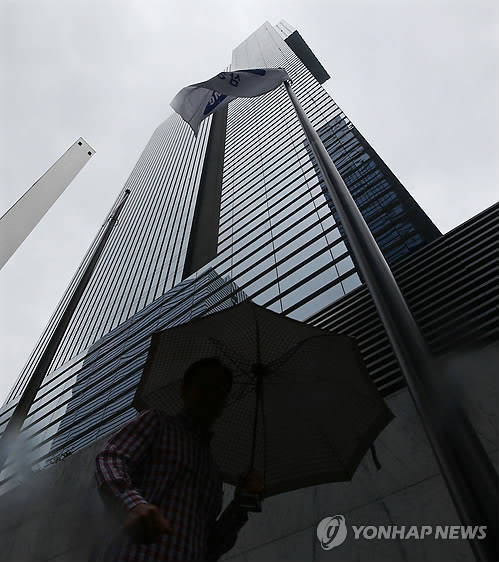Samsung Group, South Korea's biggest business conglomerate, is on high alert on Friday as the group's de facto leader, Lee Jae-yong, has been formally detained over his alleged role in a widening corruption scandal that led to the impeachment of President Park Geun-hye.
Special prosecutors investigating the scandal filed an arrest warrant against Lee, vice chairman of the group's crown jewel, Samsung Electronics Co., earlier this week for a second time in a month with expanded charges.
 |
Samsung headquarters in Seocho-dong (Yonhap) |
The investigation has focused on Samsung's ties with Park as prosecutors accused Lee of allegedly paying bribes totaling 43 billion won ($37.8 million) to two foundations set up by Park's longtime friend, Choi Soon-sil.
Prosecutors alleged that the bribes were paid to win favor from the country's state pension fund in 2015, when Samsung merged two of its affiliates, a move seen as critical for Lee's succession plan.
Lee was also accused of embezzlement, perjury and allowing the group to buy two pricey horses for the daughter of Choi.
Park, who was impeached by the National Assembly in December last year, is awaiting the Constitutional Court's decision on whether to uphold her impeachment.
Park, Choi and Samsung Group have denied the accusations of bribery.
Despite the fact that there is no risk for Lee to take flight or destroy evidence, the court's decision to grant an arrest warrant against Lee suggested that the case of Lee may be tied to the fate of Park, legal experts said.
Prosecutors can detain Lee for up to 21 days before formally putting charges against him.
Samsung officials, who had vowed to "reveal the truth in the court" before the arrest warrant was granted, expressed serious concerns that a leadership vacuum would make the group's key business decisions hit a standstill.
Lee has played a key role in making the group's business decisions since his father was hospitalized over a heart attack in 2014.
With the scandal engulfing the group for months, Samsung has not conducted its annual personnel reshuffle and failed to lay out its business targets for this year.
"It is very regrettable that the court granted an arrest warrant against Vice Chairman Lee, although there is no flight risk or destruction of evidences," a Samsung official said.
During the court's deliberation, Lee was said to have denied the allegations of bribery and embezzlement.
Another Samsung official said the group's decisions on new investments or acquisitions would be "significantly shrunk" because of a leadership vacuum.
Lee has now become the first Samsung Group chief to be behind bars. In 2008, Lee's father, Lee Kun-hee, and three other senior Samsung executives were indicted on charges of financial wrongdoing.
Until the senior Lee made a comeback in 2010, caretaker leaders had made key business decisions at Samsung.
With Lee facing a formal arrest, the group's Future Strategy Office, which supervises Samsung's groupwide business decisions, is expected to play a key role in making decisions.
However, the group's reorganization plans, including a possible shift of Samsung Electronics into a holding company structure, are unlikely to take shape before Lee is released, Samsung officials said.
Last November, Samsung Electronics announced an $8 billion deal to acquire Harman International Industries Inc.
Shareholders of Harman are set to hold a meeting later this week to vote on the deal.
Samsung officials have also voiced worries that the Harman deal may be negatively affected by the detention of Lee.
The detention of Lee came at a time when Samsung is trying to limit the damage done by the global recall of the Galaxy Note 7 over safety concerns.
Industry observers said Samsung may be affected by U.S. anti-corruption laws after Lee was arrested on charges of bribery.
Although Samsung Electronics is not listed on U.S. stock exchanges, there is a possibility that Samsung's businesses could be limited under the U.S. Foreign Corrupt Practices Act, they said.
Kwon Tae-shin, head of the Korea Economic Research Institute who served as the nation's ambassador to the OECD in 2006, said:
"At that time, the OECD prohibited it from dealing with corrupt companies. There is a possibility that Samsung may be excluded from public tenders by international organizations in the future." (Yonhap)








![[Today’s K-pop] Blackpink’s Jennie, Lisa invited to Coachella as solo acts](http://res.heraldm.com/phpwas/restmb_idxmake.php?idx=644&simg=/content/image/2024/11/21/20241121050099_0.jpg)